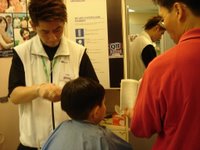十幾年來首次回鄉探親,滄海桑田。少時數度回鄉,每次出門阿爸都說:「去找阿添,佢大你幾歲,你應叫佢...佢係你...阿叔。」就這樣,茶怪與添叔相識多年,阿爺個兄弟個仔就是他,這個家族關係flow chart,茶怪最近才敲得清楚。
阿爸口中的老家沒有一個是壞人,但對於年少的茶怪可不是。小茶怪覺得鄉下人都很貪心,總是要求你送甚麼,從舊衣服到彩色電視機,有次阿爸買了一雙新波鞋給一位小朋友,小茶怪氣壞了,他們那麼貪心,老是要人家的東西,為何還送波鞋給他們 ! 添叔帶小茶怪到處玩,小茶怪都不太在乎,反正回鄉只是阿爸吩咐的例行公事。上次臨走,添叔問茶怪可否把隨身的walkman留給他,茶怪斷言拒絕,心想,是我的為什麼要給你!
一轉眼就十幾年,週六茶怪帶茶太和弟弟回鄉祭祖,想不到當年劉華「天長地久」長毛look的添叔已變了平頭裝黎智英look,是一家小型工廠的老闆。添叔帶茶怪三人到處走,四驅車取代了已往的單車,全程三餐膳食由他結帳,不是很豪華的餐館,但食物和節目悉心安排,談做生意、投資、信用卡、講教育理想等,walkman的事沒有再提。
臨別時茶怪感到不好意思麻煩了添叔一個週末,邀請他到香港旅遊,說冒必盡地主之誼,好好安排,誰不知他對這邊的購物商店和主題公園不為所動,答: 「生意很忙,走不開。」還道: 「再回來吧,我們都是一家人。」
 意外,在我來說一點也不陌生。它發生了就是。攝於灣仔海旁。
意外,在我來說一點也不陌生。它發生了就是。攝於灣仔海旁。 兄弟、姊妹。如果你有兄弟、姊妹,可有留意,當你們一起外去,路人是何等輕易地認出你們的關係。兄弟、姊妹生下來相貌相似,是多麼微妙的事情。我有時想,每個人都有眼耳口鼻,全球四十億人每人一個樣,簡易如眼耳口鼻竟然可以拼湊出四十億不同組合。而當中兄弟姊妹卻似樣,是多麼寶貴,尤其是當大家都老了,各走自己的人生路,相貌也許隨著際遇和心境而變,但當走在一起,始終是一套的。攝於電氣道。
兄弟、姊妹。如果你有兄弟、姊妹,可有留意,當你們一起外去,路人是何等輕易地認出你們的關係。兄弟、姊妹生下來相貌相似,是多麼微妙的事情。我有時想,每個人都有眼耳口鼻,全球四十億人每人一個樣,簡易如眼耳口鼻竟然可以拼湊出四十億不同組合。而當中兄弟姊妹卻似樣,是多麼寶貴,尤其是當大家都老了,各走自己的人生路,相貌也許隨著際遇和心境而變,但當走在一起,始終是一套的。攝於電氣道。 萬千寵愛在一身。小朋友啊,讓叔叔告訴你一個殘酷的現實,你不是王帝。聽了,你可能有點不快,不過,知道得早總好過遲。攝於工展會。
萬千寵愛在一身。小朋友啊,讓叔叔告訴你一個殘酷的現實,你不是王帝。聽了,你可能有點不快,不過,知道得早總好過遲。攝於工展會。
